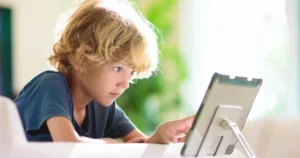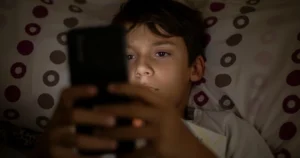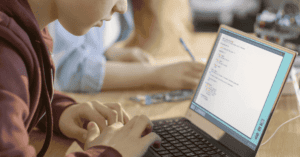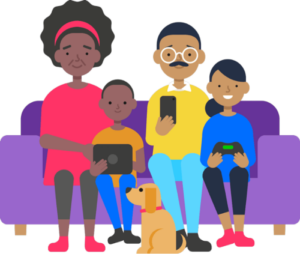With most social media apps, platforms or games age rating of 13+ doesn’t mean those younger are not on them. This is why it is important as a parent or carer if your child is socialising online, they are doing it safely.
What can parents do to help their kids socialise safely online?
Communicating online has become increasingly important. Families have used social media to keep in touch and fortunately, more and more people are recognising the benefits of technology as a result.
Children and young people are no different – from an early age, they are aware of some of the more popular social media platforms either from older siblings or parents or from friends who have an account despite the usual 13+ age limit. 6-10-year-olds are likely to be chatting to friends in games that they are playing and we know that as they get into the final years at primary school many do start using social networking sites themselves. It is important that parents sit down with their children and set up their accounts in the safest possible way.
Ensure that they are set to private (many are public by default so don’t assume it’s the other way around), consider turning off comments so that children won’t receive anything that is unpleasant or unexpected.
Choosing online friends carefully and only communicating with people they already know is sensible. Always ensuring that there is open dialogue – if something goes wrong then it is important that children feel that they can talk to their parents about it – if they are fearful of the consequences then they are unlikely to open up. Setting some ground rules about their own behaviour too – they should treat others online in the way they would want to be treated themselves and it is worth reiterating this message. As children get older, parents can help them to become familiar with some of the more granular settings such as moderating comments and blocking particular words or phrases etc. Some games will provide bespoke tools for parents – e.g. Roblox has an “age-visibility” feature which allows parents to determine whether settings for their children are age-appropriate.
Young children are not accountable for their safety online and so our first step as parents should be to understand the app, check the privacy settings, test it out, and feel confident that this is a place we want our child to be.
Check-in and see how they are using it, what they like, what they don’t like, and if we can help with anything. Discuss what it means to be a friend (face to face and online), why it’s important to be careful what we share with others, the potential impact of what we say and do, and how they might manage tricky situations like receiving a message that makes them sad or falling out with a friend.
Finally decide together a sensible amount of time to spend socialising online, and make sure it’s part of a balanced approach to building relationships and spending time with others.
The online world can be a great place for children to stay connected, whether that’s with friends over the holidays or family who live far away. Whilst they’re using technology there are a few key things to keep in mind.
It’s important to have a conversation about who they’re talking to, and any rules or expectations you want to set; for example, are they allowed to join chats or games with friends of friends? Setting expectations beforehand is often easier than restricting use later.
Discuss when, where, and for how long they will use technology, agreeing together on acceptable limits and behaviours. For example, you could decide that technology is only used in a shared family space, or in bedrooms with the door open. A family agreement can help your family decide what’s right for you. And remember, it’s vital to let your child know that they can speak with you if anything happens online that worries or upsets them.
Should you ask permission before sharing children’s photos?
Given that children will be aware of these platforms, it is important for parents and carers to talk to them about it. Perhaps parents can agree to post some photos of a family outing or birthday celebration. This can help to introduce some of the important concepts around sharing and privacy – who will be able to see what we post! Similarly, parents can model good social media etiquette – they shouldn’t be posting images of their children onto social media unless they have checked with their children first.
At this age, a social media experience should be a shared experience based around the parent’s account and taking opportunities to discuss privacy settings, what to do if there is a problem and the importance of giving careful consideration to what you post and who is able to see it!








